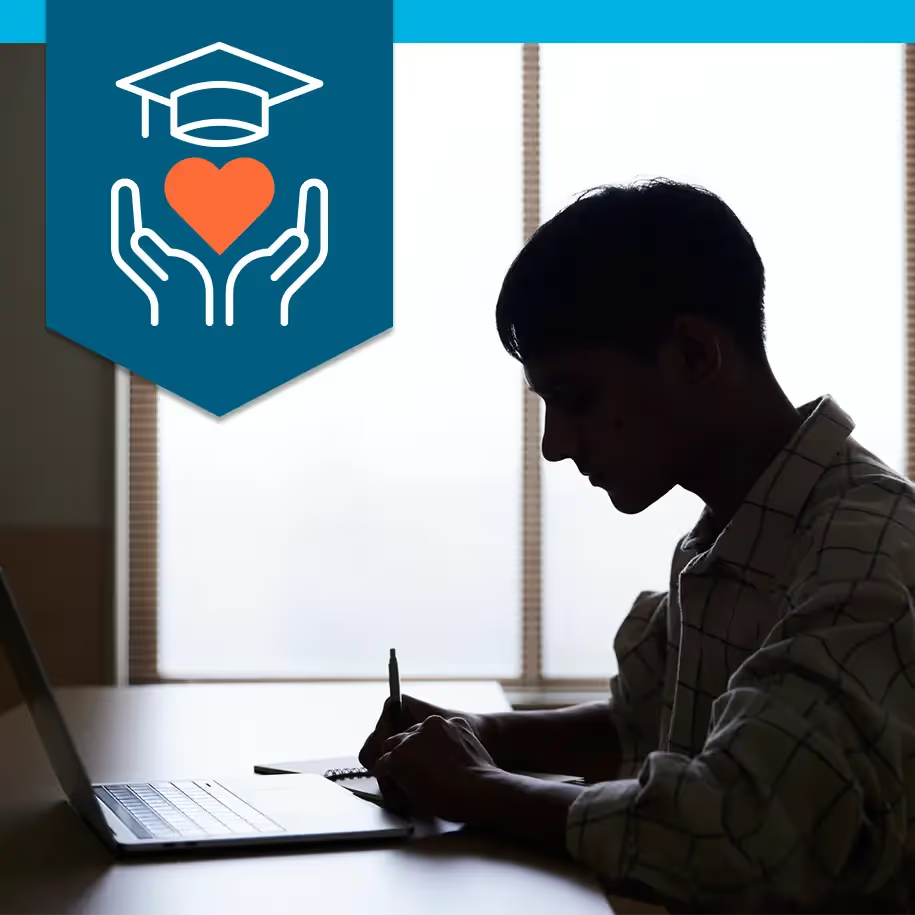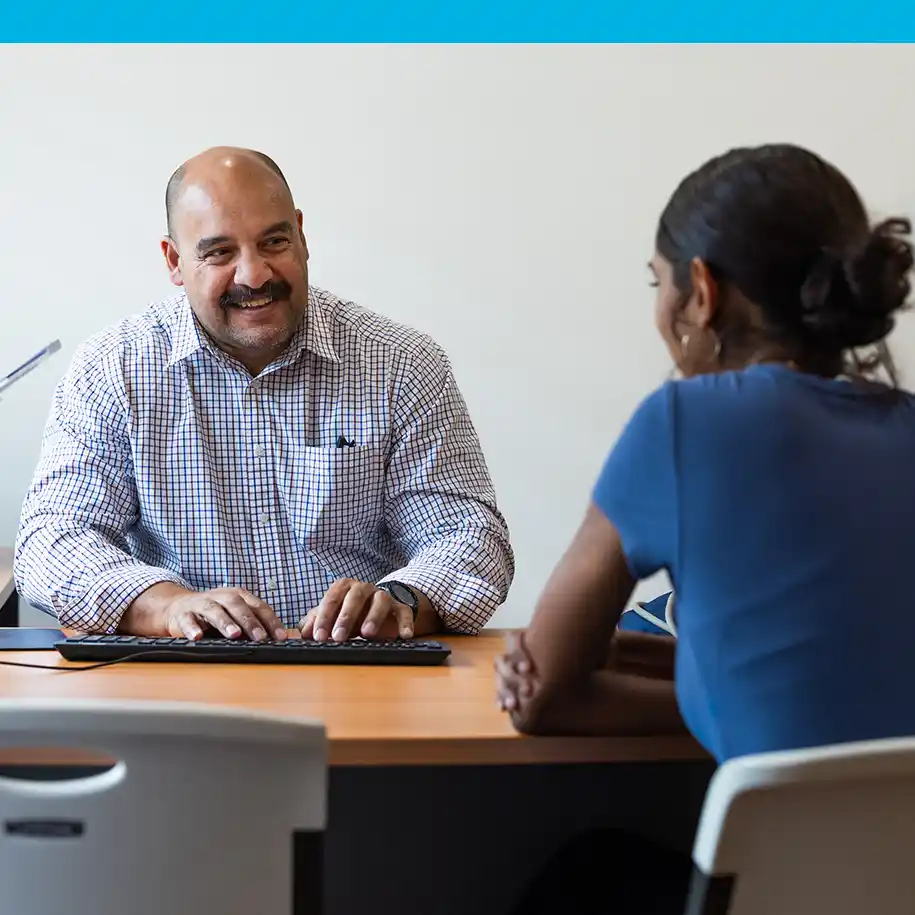.avif)
Understanding the importance of microgrants to learners in crisis
A Crisis Support Services team member explains InsideTrack’s microgrant program – and how you can make an impact
The holidays are a time for gathering, gratitude and giving. This year, as you join together with friends and family to share the spirit of the season, we hope you are able to take some time to reflect on the blessings in your life and look forward with a sense of renewal toward all that lies ahead in the new year.

For us at InsideTrack, one of our many blessings is the ability to provide Emergency Support Microgrants to learners in crisis — ensuring that they aren’t left without support in a moment when they need it the most. That support could be a few bags of groceries when the refrigerator is bare. A paid electric bill to keep the heat and internet on. Or a lab fee, textbook or bus pass that without, a learner may not be able to continue in school. To learn more about this much-needed program, we spoke with Michondria “Dree” Land, a member of our Crisis Support Services team.
“These grants are small but mighty”
When an InsideTrack Success Coach comes across a learner in crisis, the coach is able to connect them directly to our Crisis Support Services (CSS) team — a specially trained and certified team uniquely qualified to assess and stabilize the situation, then connect the learner with campus, community and other available resources. But what happens when there’s an immediate and urgent need? Like when a learner needs a new tire in order to drive to class, but payday is several days away. Or a domestic abuse situation requires money for a few nights in a safe place. That’s where emergency microgrants come in.
As Dree explains, “These grants may be small, but their power is mighty. Microgrants are designed to get a learner over the hump — addressing their immediate needs — and then we can help them tap into long-term resources.”
When asked about her day-to-day role, Dree answered, “I help learners to overcome hardships outside of education, like food and housing insecurity, mental health issues, bills, domestic violence and so on. Having the ability to help someone with a microgrant has given us an extra way to help learners out in pressing situations where they are often overwhelmed.”
“We are here to help”
Dree believes that because CSS conversations are confidential, learners who are struggling through serious issues are more willing to open up and share their stories. “They hear how warm and caring we are, and how willing we are to help, and before long, the floodgates open,” she says. “They appreciate the fact that there’s no judgment here. We’re a safe space. They feel OK trusting us and telling us about their financial struggles and their personal problems. We do a lot of listening.”
“I’ve had many learners tell me how much they appreciate the fact that they have someone who is there for them — someone to listen and not judge them. It touches my heart that our team is here to listen and support and help.” And at the end of the day, the help Dree and her CSS colleagues provide can make a huge difference in the lives of the learners they work with, as well as their families.
“I’ve had many learners tell me how much they appreciate the fact that they have someone who is there for them — someone to listen and not judge them. It touches my heart that our team is here to listen and support and help.”
“Take a breath, we’ll work this out…”
Being on the CSS team means connecting with dozens of learners in crisis every week. One recent story stood out to Dree — a learner who was connected to the CSS team through her success coach at a workforce organization. “A single mom in Hawaii had finally been able to move out from her parents’ house. In Hawaii, everything is super expensive and she was struggling to make ends meet, including the rent.” Dree says that’s when the learner really opened up, explaining how she didn’t have food for the kids and had received a shut-off notice for the electricity. “She really opened up to me about her struggles. I told her to take a breath, we’ll work this out. Then I went to advocate for her.”
In this case, Dree’s advocacy meant paying the electricity bill and using Instacart to deliver food to her door and fill the refrigerator. “These are one-time grants with a cap of $600 per learner. We use them as a bridge between the immediate crisis and available resources to help get the learner back on track. A grant may be small, but they’re powerful for those who need it.”
“It makes me feel happy”
When Dree was in college, she had classmates who didn’t have any support. “They were literally dropped off at school, and that was it,” she says. “I watched my peers struggle, and knew that if they failed, that was it, they’d be done with college.”
She shared a story about how she would buy groceries for classmates struggling with food insecurity. “I would call my dad and tell him I needed more money for food. ‘You’re a small girl,’ he’d say, ‘how are you eating so much food?’ I had to explain that it wasn’t for me, it was for classmates who were going without meals.” And when relatives would come to campus to visit her, she would make sure those in need went out to dinner with her family. It’s clear that Dree was destined to work with the InsideTrack CSS team!
And for the past year, that’s exactly where she’s been, helping learners at institutions and organizations across the country, putting the power of the microgrant to good use. Asked for her perspective on why it’s important that people know about and consider donating to the Emergency Support Microgrant program, she explained how you never know what someone else is going through. “This person could be you. They could be a family member, a friend, a co-worker, a neighbor. You may not know that they don’t have food or are about to have their electricity shut off. They may look fine, but they may not be. They just need a little bit of help. That’s what it’s like for our learners. They just need a little help to get over the hump.”
“This person could be you. They could be a family member, a friend, a co-worker, a neighbor. You may not know that they don’t have food or are about to have their electricity shut off. They may look fine, but they may not be. They just need a little bit of help. That’s what it’s like for our learners. They just need a little help to get over the hump.”
And that’s exactly what the Emergency Support Fund does by providing microgrants to learners in need. “It makes me happy making the learners feel supported. So many people just go to college, with no plan and no support. Now, anyone being coached by an InsideTrack coach can connect with our Crisis Support Services team where we will support you… encourage you… work with you. We’re here to listen and support and help.” And sometimes that includes an emergency microgrant.
“It’s in my heart, everything that we do,” she says with a warm smile. “I’m 100% satisfied from the time I clock in to the time I clock out.”
In this season of giving, we invite you to make a tax-deductible donation to our Emergency Support Fund, used to directly help learners in crisis. Learn more about how you can give, read firsthand learner stories and hear from other Crisis Support Services team members.
Coaching solutions proven to advance all learners
Whether you’re looking to help students persist through completion or to improve career outcomes for job seekers and employees, our holistic coaching solutions can help you achieve meaningful outcomes.



